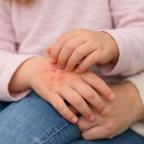
Improvements seen in children and young people's wellbeing
State of the Nation report highlights positive impact of keeping schools open, with millions more to be invested in senior mental health lead training.
From: Department for Education, Department for Work and Pensions, Department of Health and Social Care, Will Quince MP, Gillian Keegan MP, The Rt Hon Michelle Donelan MP, and Baroness Deborah Stedman-Scott OBE DL
Published 8 February 2022
Thousands of children and young people in England are benefiting from support for their mental health and wellbeing in education, as new research shows an improving picture in their recovery from the pandemic.
The Department for Education has today (8 February) published its third annual State of the Nation report, providing an in-depth picture of the experiences of children and young people aged 5 to 24 throughout the pandemic during the 2020 to 2021 academic year.
To mark Children’s Mental Health Week, the report shows children and young people’s wellbeing is gradually improving, despite the challenges that remain.
There is a link between regular attendance at school and college and positive wellbeing across all groups of children and young people, highlighting the positive impact of face-to-face learning.
For the first time it also provides data on their views about wider society and their futures, including their worries about staying safe online.
The new report comes as nearly 400 mental health support teams will be accessible to almost three million school and college pupils in England by 2023, surpassing the commitment made in the 2017 mental health green paper.
More than 8,000 eligible schools and colleges have applied for a senior mental health lead training grant since applications opened, with an additional £3 million to be provided to extend this training to more schools and colleges given high demand, so that everyone eligible who wishes to access training before the end of May will be able to.
Children and Families Minister, Will Quince said:
The resilience of children and young people should never be underestimated. Though they have coped remarkably well over the last few years, this report once again highlights that school is often the very best place for their education and wellbeing.
These two things must go hand in hand, which is exactly why we are investing so significantly in mental health services, both by improving access to NHS services and by making tailored support available in schools and colleges, with training for staff to confidently deliver this.
I’m encouraged to see so many schools and colleges taking up this training and am grateful to them for the critical work they do to support their students’ wellbeing. It’s important that we use this report to reflect the experiences of children and young people in everything we do – whether it’s boosting mental health support in schools, our work to improve nutrition, or making the internet a safer place for children to spend time.
Funding for the online platform Student Space, led by Student Minds, will also be extended to July 2022 to support university students’ mental health and wellbeing in England and Wales. Since August 2020, it has helped many young people navigate their studies through the challenges created by the pandemic.
Minister for Higher and Further Education, Michelle Donelan said:
University is without doubt an unforgettable experience but even at the best of times it is not without its challenges. Throughout the pandemic, protecting students’ mental health and wellbeing has therefore been of the utmost importance to me.
As the country begins the transition from pandemic to endemic, it is vital that students get the support they need. That is why I am pleased the Office for Students will be providing funding for the extension of the Student Space platform through to the end of this academic year.
The government has also announced additional funding worth £11 million for its Reducing Parental Conflict programme, which funds councils across England to create bespoke relationship support for parents in their communities, helping to improve mental health and wellbeing.
The funding will help develop innovative new projects that target children and parents most in need or continue successful existing projects. It comes as the State of the Nation report found that while the majority of young people had a good relationship with their family on average, children who indicated they had a poorer relationship with their parents were more likely to have a mental health problem.
The new funding can be used by councils to train frontline staff working closely with families in sectors such as policing, schooling, health and social care, so they know how to spot parental conflict and can step in to support parents and ensure children do not suffer as a consequence. It builds on £47 million already allocated to the programme which has supported thousands of families since launching in 2018.
DWP Lords Minister Baroness Stedman-Scott said:
Arguments and occasional bickering might seem harmless but when this kind of conflict is continually aggressive and left unaddressed, it can cause real unhappiness and harm children’s life chances.
That’s why we’re investing millions into helping parents recognise and address potentially harmful conflict so more children can grow up in happier homes.
We want every child to have the best start in life and a further £11 million will build on what we’ve achieved to date.
Other key drivers and trends in the State of the Nation Report include:
- education and skills: children and young people’s happiness with life at school between April and June 2021 remained consistent with previous years. Further supporting a link between attendance and wellbeing, pupils with higher wellbeing ratings were more likely to have regularly attended school
- personal wellbeing: evidence suggests that drops in wellbeing occurred most clearly for primary and secondary pupils in February 2021, when schools were closed to the majority of pupils
- physical health and activity: there are signs that obesity rates increased substantially between 2019/20 and 2020/21 among both reception and year 6 age children, accelerating a trend which has continued for at least the previous 15 years. However, rates of physical activity have remained relatively consistent, with rates of children and young people engaging in 60 or more minutes of physical activity per day at similar levels in 2020/21 to 2017/18
- relationships: on average, young people indicated high levels of happiness with their family relationship, which was consistent with previous years. Relationships with friends also showed signs of recovery in 2021 following a small reduction in 2019 and 2020
- self, society and the future: children’s happiness with their appearance and future has remained stable in recent years, with signs of improvement in children’s average happiness with their sense of choice in life. Young people indicated that some of their biggest worries about the future included the environment, finding a job, homelessness, and crime
- online safety: 5% of 9 to 17-year-olds were unhappy with their experiences online, with unhappiness with online experiences appearing to increase with age. When thinking about their future, 29% of children and young people were also most likely to be worried about online safety
The data on online safety is the first time such a theme has been noted in the State of the Nation report and highlights the importance of supporting young people to keep safe online. With today marking Safer Internet Day, the government and organisations across the country are coming together to raise awareness of how to help children and young people navigate the virtual world safely and positively.
Online safety is a key component of the mandatory relationships, sex and health education curriculum, teaching young people about privacy online, how to protect themselves and about respectful relationships – online as well as in person.
The Department for Education is also working with the Children’s Commissioner Dame Rachel de Souza to support parents with helping their children use the internet safely. Ministers and the Children’s Commissioner recently met with technology companies to ask them to do more to keep young people safe and be more transparent with their data ahead of the Online Safety Bill coming into effect.
Minister for Mental Health Gillian Keegan said:
Children and young people were uniquely impacted by the pandemic and while they showed incredible resilience throughout, it is right that as we look to the future their mental health is prioritised.
We are investing more than any other government in expanding and transforming mental health services, including rolling out mental health support teams in schools, and it is encouraging to see the positive impact this is having on students’ mental health and wellbeing.
Early intervention is key to ensuring good mental health, and it’s vital that all children, no matter where they are in the country, have access to these services to ensure every child has the best chance to live a healthier, happier life.
The data presented in the State of the Nation report draws upon published information from a range of government, academic, voluntary, and private sector organisations across the 2020 to 2021 academic year, and therefore reflects the experience of children and young people in England during that time.
Schools and colleges can continue to book onto courses for senior mental health lead training into April and May 2022. More information on funding for 2022 to 2023 will be provided in the spring. Further information on senior mental health lead training is available.
The Reducing Parental Conflict programme mostly focuses on disadvantaged families, where factors like both parents being out of work, can exacerbate conflict. Current programmes include interventions linking local authorities, health, education and voluntary sectors to tackle poor mental health and issues such as substance misuse which stem from relationship challenges, including Rochdale’s award-winning ‘Relationship Revolution’, a whole system approach to talk about parental conflict and address their community’s needs. Their joined-up approach has transformed life for families and has since been adopted by other areas in England. Other successful projects have included online relationship support and learning videos, counselling for parents, and toolkits for frontline services.
Councils will be able to bid for a share of the funding for projects from April 2022. Similar levels of investment in the programme will follow in the financial years up to 2025.
Professor Gordon Harold from Cambridge University who launched a landmark report in 2015 on the importance of reducing parental conflict, said:
The RPC programme aims to reduce the adverse impacts that parental conflict causes to children through the provision of new support for parents, training for family practitioners and better awareness, understanding and coordination of parental conflict related services delivered by local authorities and their partners; all with one core aim – to promote improved mental health outcomes for at-risk children and adolescents.
Cristina Odone, Head of Family Policy at The Centre for Social Justice said:
Unresolved parental conflict can spiral into violence and domestic abuse, affecting children’s mental health. The impact is felt long term.
DfE enquiries
Central newsdesk - for journalists 020 7783 8300
General enquiries - for members of the public 0370 000 2288














